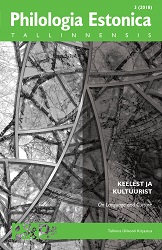Tingiv kõneviis viisakuse väljendajana eesti B1- ja B2-taseme õppijakeeles
Expressing politeness via use of the conditional mood in the B1- and B2-level texts of learners of Estonian as a second language
Author(s): Mare KitsnikSubject(s): Language studies, Language and Literature Studies, Foreign languages learning, Applied Linguistics, Finno-Ugrian studies, Philology
Published by: Tallinna Ülikooli Kirjastus
Keywords: second language acquisition; Estonian as a second language; written language; language constructions; language politeness;
Summary/Abstract: The article addresses use of conditional mood constructions to expresspoliteness in the written Estonian as a second language learnersat B1- and B2-levels of the CEFR. The research material consists ofperformances in the writing tasks of the state exams of Estonianas a second language and it comes from the Estonian InterlanguageCorpus (EVKK). The material contains different types of lettersand essays. There were fewer opportunities to use the conditionalmood in the B1-level texts than in the B2-level texts. However, theauthors of the B1-level texts preferred to use the indicative moodeven where the use of the conditional would have been appropriate.In the B2-level texts there were more possibilities to use the conditionalmood and the authors of these texts did take advantage of theopportunities, given the formal nature of both the text and situation.The conditional mood constructions recorded occurred mostcommonly in letters addressed to institutions, and so were more formalin nature and connected to more institutional situations. Thus,the use of the conditional mood to express politeness was relatedto cultural norms of linguistic politeness. Proficiency in use of theconditional mood to express politeness was greater at the B2-levelthan at the B1-level. The main reason for this may be the impact ofthe cultural and linguistic environment.
Journal: Philologia Estonica Tallinnensis
- Issue Year: 3/2018
- Issue No: 1
- Page Range: 155-185
- Page Count: 31
- Language: English, Estonian

